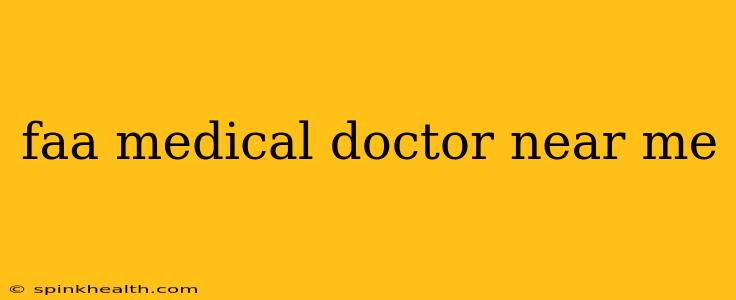The hum of the engine, the wind rushing past your face, the boundless sky above – for pilots, the freedom of flight is unparalleled. But before you can soar to new heights, there's a crucial step: obtaining your FAA medical certificate. This isn't just a formality; it's a testament to your health and fitness to safely operate an aircraft. Finding the right FAA Aviation Medical Examiner (AME) is key to a smooth and successful process. This journey, like a flight plan, requires careful planning and the right resources. Let’s navigate it together.
How to Find an FAA Medical Doctor Near Me?
The first step in your journey to securing your FAA medical certificate is finding a qualified Aviation Medical Examiner (AME) near you. This isn't as simple as searching for "doctor near me"—you need a specific type of doctor. Fortunately, the FAA provides a helpful online database. Simply visit the FAA website and utilize their search tool; you'll input your location, and it will display a list of AMEs in your area. Consider factors like distance, appointment availability, and reviews when making your selection.
What are the different classes of FAA Medical Certificates?
The FAA offers various classes of medical certificates, each corresponding to different levels of pilot certification and operational privileges. The classes range from First Class (for airline transport pilots) to Third Class (for many private pilots). The specific class you need depends entirely on the type of flying you intend to do. Your chosen AME will guide you through this process, explaining the requirements and helping you determine the appropriate class for your needs.
What medical conditions might disqualify me from getting an FAA Medical Certificate?
This is a crucial question, and the answer is nuanced. The FAA has specific medical standards that must be met for each class of medical certificate. Conditions such as uncontrolled high blood pressure, certain heart conditions, poorly controlled diabetes, and some forms of epilepsy could potentially impact your eligibility. However, it's crucial to understand that this is not an exhaustive list, and individual circumstances vary greatly. Your AME will thoroughly evaluate your medical history and current health to determine your suitability. Don't be discouraged if you have a pre-existing condition – many pilots successfully obtain medical certificates even with certain health challenges, often requiring ongoing monitoring or specific treatment plans.
How much does an FAA medical exam cost?
The cost of an FAA medical examination varies depending on the AME's location and the complexity of your examination. It’s best to contact the AME directly to inquire about their fees before scheduling your appointment. Be prepared to provide them with your medical history, any relevant medical records, and any current medications you are taking. This will help them efficiently assess your eligibility.
How long does the FAA medical exam take?
The duration of your FAA medical examination can vary, depending on your individual circumstances. Simple examinations might take an hour or less, while more comprehensive evaluations may require several hours. It's essential to allow ample time for the appointment and be prepared for a thorough assessment of your health.
What should I bring to my FAA medical exam?
Be prepared. Bring your current driver's license or other valid form of identification, a list of your current medications, and any relevant medical records (especially those related to cardiovascular health, vision, hearing, or any other conditions). It's also advisable to bring a copy of your medical history if possible. The AME will need this information to accurately complete your application.
Finding the right FAA medical doctor is a crucial step in your piloting journey. By utilizing the resources available and understanding the process, you can confidently pursue your aviation dreams and safely take to the skies. Remember, this isn't just about fulfilling requirements; it's about ensuring your health and the safety of all those who share the airspace with you. Happy flying!

